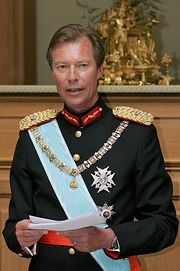Victor Emmanuel I
| This page is a work in progress by its author(s) and should not be considered final. |
| Victor Emmanuel I | |
|---|---|

| |
| Victor Emmanuel I addressing the Political Club, Westminster in August 2011 | |
| King of Kiribati and Tarawa | |
| Reign | 30 April 1990 – present |
| Coronation | 12 May 1990 |
| Predecessor | Umberto IV |
| Prime Minister | Catherine Willoughby |
| Spouse | Mary Bowes-Lyon |
| Issue | Edward, Prince of Norfolk
George, Duke of Lancaster Anne, Duchess of Nottingham Sophia, Duchess of Cambridge Catherine, Duchess of Stanford |
| House | House of Grimaldi |
| Father | Umberto IV of Kiribati-Tarawa |
| Mother | Princess Annemarie of Prussia |
| Born | 22 March 1958 Whitehall Palace, Westminster |
| Religion | Church of Tarawa |
Victor Emmanuel I (full name: Victor Emmanuel Jean-Michel George William Umberto, born 22 March 1958) is the reigning King of Kiribati-Tarawa. On 30 April 1990, he succeeded his father, Umberto IV. He is the only son of Umberto IV of Kiribati-Tarawa and his wife, Princess Annemarie of Prussia.
Upon his ascension to the throne on 30 April 1990, the King became Head of the Kiribatian Commonwealth and thus also became King of the twelve commonwealth realms, as well as the King of the eleven Kiribatian overseas territories. He inherited the throne amidst domestic turmoil; the Kiribatian economy was stagnating, foreign threats loomed from abroad, the price of petroleum had doubled in less than a year, and the people of Kiribati-Tarawa wanted a strong King who could reform the country. His father, King Umberto IV, was considered by many to be incompetent. He did not busy himself with the affairs of the kingdom and instead focused on his own personal dealings. The new King, Victor Emmanuel, took on an aggressive policy towards combatting the issues facing Kiribati. He is often criticised as being too interventionist in his dealings with Parliament, so much so that, in 2001, a group of Labour MPs formally demanded his abdication, which he rejected.
As monarch, he is head of state and commander-in-chief of the armed forces. He is married to lady Mary Bowes-Lyon, the daughter of a wealthy Earl, with whom he has five children.
Early life
Victor Emmanuel was born in Whitehall Palace in Westminster, the principal the residence of the Kiribatian monarch, on 22 March 1958 to Umberto IV of Kiribati (then Umberto, Prince of Norfolk). He was christened at the Cathedral of Saint Thomas Aquinas in Westminster on 5 August 1958 by the Archbishop of Westminster John Connolly. His godparents were Augusta-Sophia von Hohenzollern (his maternal grandmother), Johan Michael von Hohenzollern (his maternal uncle), Augustine Grimaldi, Duchess of Salisbury (his paternal aunt), and George VII, King of Kiribati-Tarawa (his paternal grandfather).
Prior to becoming the Prince of Norfolk when his father inherited the throne, Victor Emmanuel held the title Duke of Oxford.
Youth and education
Prior to his father's ascension to the throne in 1981, the Prince of Norfolk, his wife, and his only son, Victor Emmanuel, lived a quiet life away from Westminster at Summerhall House in Devonshire. The remote, isolated beach house was built as a summer residence for the Prince, and its existence was not known until recently. The Prince of Norfolk, Umberto (the future Umberto IV) highly valued solitude and wanted to spend as much time away from court as possible. The family spent the entirety of the summer months at Summerhall House, returning reluctantly to Westminster for the winter. In his memoir, God Save Me, the King, the Victor Emmanuel writes, "My times at Summerhall were some of the best of my life. I loved the simplicity, and I wouldn't exchange them for the world."
As is customary for members of the royal family, Victor Emmanuel did not attend school before attending university; rather, he was tutored by Sir William Wolsey, a well-respected Kiribatian scholar and academic. The future King established a close personal bond with his tutor; upon Wolsey's death in 2006, the King arranged and paid for a state funeral to be held for him, at the expense of the Crown.
At the age of 18, the then Duke of Oxford attended the University of Westminster, where he studied foreign relations, and at the age of 22, his father inherited the throne, thus making him the new Prince of Norfolk.
